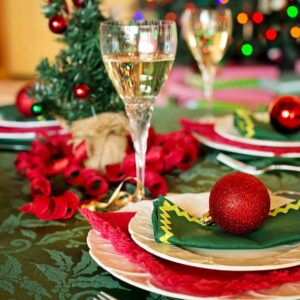What do you eat for Christmas in Germany?
What Do Germans Eat for Christmas? A Guide to Traditional Christmas Meals
Christmas is one of the most celebrated holidays worldwide, and Germany has a rich tradition of festive meals that bring families together. From religious ceremonies to family reunions and special dietary customs, German Christmas dinner is a cherished event. In this guide, we explore the traditional dishes served on Christmas Eve in Germany, their historical significance, and how you can incorporate these delicious elements into your celebrations.

German christmas table
Traditional German Christmas Meals
In Germany, Christmas dinner typically includes a variety of meats such as duck, goose, rabbit, or roast. These main courses are often accompanied by German specialties like liver dumpling soup, apple and sausage stuffing, red cabbage, and potato dumplings. For dessert, Christstollen, a traditional German Christmas cake, is a must-have. This rich and flavorful pastry is considered one of the best Christmas treats in the world.
The Significance of December 24th
Germany celebrates Christmas on December 24th, aligning with the Roman calendar, which does not include December 25th. This tradition dates back to a 16th-century revision of the church calendar that moved Christmas to the day of Jesus’ birth. As a result, many Germans refer to Christmas as “Christkindlmarkt” or “Christmas Market.” This term originally described the act of giving gifts, as presents were believed to be delivered by “Christians” who believe in Christ.
German Christmas Traditions
If you’re looking to add German elements to your holiday celebrations, consider incorporating authentic German recipes. In Germany, Christmas Eve is a time for families to gather and share a traditional meal. Some families enjoy a large meal every night leading up to Christmas, while others prepare several smaller dishes, allowing everyone to sample a variety of flavors without feeling too full.
German cuisine is rich in pork, which adds savory flavors to many dishes. Popular beverages during this festive time include mulled wine, a spiced and heated wine that complements the hearty meals. Decorations and stockings are also an integral part of the holiday, often placed in front of windows.
Advent Celebrations
During the Advent season, Germans celebrate the birth of Jesus with traditional meals. A typical festive evening might include roast pork with apple sauce and potatoes, followed by apple pie for dessert. Christmas spices such as cinnamon, cardamom, vanilla, and cloves add a warm and festive touch to holiday treats.
Popular Dishes Across Germany
While regional variations exist, potato salad with sausages remains one of the most popular Christmas dishes in Germany. This dish includes Viennese sausages, Bockwurst, or Weisswurst, often served with mustard. In East Germany, Solyanka, a hearty soup, is a common starter.
On the first or second day of Christmas, families enjoy a grand feast featuring traditional dishes like roast goose with potato dumplings and red cabbage. These meals symbolize the culinary highlight of the year, with an abundance of food and drink, including typical meat-based dishes like Christmas roasts, carp, goose, and sausages, as well as vegetarian options.
Modern Christmas Celebrations
While many Germans still celebrate Christmas with traditional meals, modern practices have evolved. During World War II, families were often separated due to travel restrictions, leading to the development of virtual celebrations. Today, families continue to gather for festive meals, but they often connect via Skype or FaceTime, sharing their holiday cheer across distances.
Conclusion
German Christmas celebrations are steeped in tradition, from the sumptuous meals to the festive decorations and gatherings. Whether you’re enjoying a traditional Christmas dinner with loved ones or embracing modern ways of celebrating, the spirit of togetherness and joy remains at the heart of the holiday.

